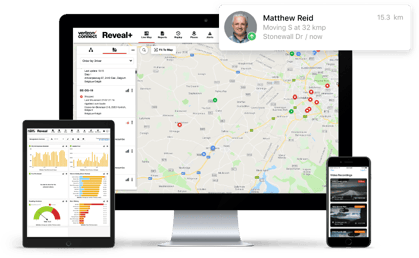Fleets in Ireland are decreasing costs with fleet management
A GPS fleet management solution can help your company reduce operational costs and increase its competitiveness.
Read more
One of the main objectives for any fleet manager is to reduce operating costs. Implementing business cost saving strategies is also crucial for large companies that need to see the big picture, identify hidden expenses and set goals to achieve business cost reductions in key areas like fuel, labour and vehicle maintenance, among others.
Let’s check out some crucial strategies that can help your organisation:
Efficient fuel management is crucial when it comes to fleet operating costs because it enables every litre of fuel purchased to be used in a cost-effective way, thus contributing not only to the company’s economy, but also to energy savings and environmental protection.
The amount of fuel consumed depends on the condition of the vehicle, the driving environment and, most importantly, the driver’s driving behaviour.
A study reveals that “aggressive driving (speeding, rapid acceleration and braking) wastes fuel and can lower your fuel mileage by roughly 15% to 30% at highway speeds (1) and 10% to 40% in stop-and-go traffic (2)”.
In contrast, efficient driving can help reduce fuel consumption: “Experience from eco-driving initiatives all over Europe shows that car, truck and bus drivers can easily achieve a reduction in fuel of up to around 20% by adopting an energy efficient driving style” (3).
Furthermore, “the savings achieved appear to vary individually to a large extent, e.g. reaching as much as 30% for some drivers” (4).
Now, imagine the impact on a large fleet if you saved around 30% per vehicle. These savings translate into increased profitability and competitiveness for the business.
To achieve these savings, most innovative companies use advanced fleet management technologies to support the daily operations of all their equipment. The software promotes fuel efficiency, reduces emissions, as well as prioritises safety.
In fact, the latest Fleet Management Technology Trends Survey, which gathers insights from those that use advanced fleet technology, revealed that:
Optimising routes is vital for saving fuel, cutting down on emissions, and using a company’s fleet effectively. Through advanced fleet management technologies, we’re able to refine our routes to drive the necessary miles, without travelling excess distance.
This approach not only conserves fuel but also supports our commitment to sustainability. Several crucial aspects come into play in route optimisation, including selecting the appropriate vehicles, determining the best routes, and improving occupancy rates (5).
Fleet management technology can help companies to efficiently manage their fleet and strategic areas that help them stay competitive, efficient and sustainable.
In fact, the last Fleet Management Technology Trends Survey reveals that:
Download the eBook 7 secrets to cutting fleet costs and learn more about how fleet management technology can help your business.
One of a fleet manager’s main priorities is to perform proper vehicle maintenance for several reasons, these include:
Safety: vehicles should be in optimal condition to be used by the team.
Fuel consumption: poor vehicle maintenance can have a direct impact on fuel consumption.
Mechanical breakdowns: combining preventive and predictive maintenance can help prevent costly repairs such as those to the vehicle’s engine.
Fleet managers need to consider various factors, including the impact of tyre pressure on performance. Low tyre pressure “increases fuel consumption by 2% and reduces tyre life by 15%” (9). On the other hand, “high tyre pressure also increases fuel consumption and leads to tyres wearing down prematurely” (10).
It is also important to know that the condition of the oil, air and fuel filters has a direct impact on vehicle fuel consumption. If the oil filter is in a less-than-perfect condition, “it can increase the risk of major engine damage and also increase fuel consumption by 0.5%” (11).
If there is dirt in the air filter, “this can have a negative impact on the inlet manifold and increase fuel consumption by up to 1.5%” (12).
In addition, if the fuel filter is not working properly “it can increase fuel consumption by up to 0.5%, and if it becomes blocked, it could cause engine failure” (13). It is crucial to check the amount of water in the filter.
Fleet managers need to consider all possible variables. If they use fleet management technology, they have the advantage of being able to implement a flexible maintenance programme that combines preventive and predictive maintenance to meet the needs of their business.
Fleet management technology plays a crucial role in key strategic areas of the business, as highlighted by the latest trends in the Fleet Management Technology Trends Survey:
Businesses that use advanced fleet management technology gain a significant advantage, enabling them to achieve substantial improvements in efficiency, sustainability, competitiveness, and profitability.
Request your free demo and see our technology in action.
Tags: Cost control




Find out how our platform gives you the visibility you need to get more done.
A GPS fleet management solution can help your company reduce operational costs and increase its competitiveness.
Read moreFleet managers need to ensure business costs don’t get too high. Fleet management software is the perfect solution.
Read moreImplementing a GPS fleet management solution in your company can help reduce costs. Read on to find out how.
Read moreWe surveyed more than 1,500 fleet managers across Europe to find out how businesses embrace fleet management technologies.
Read more